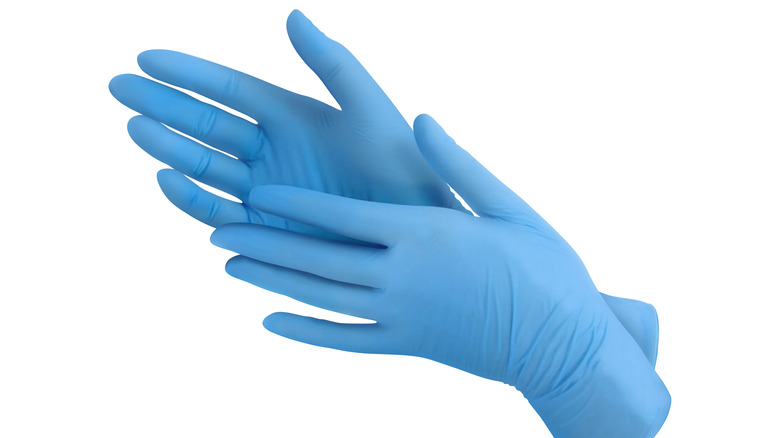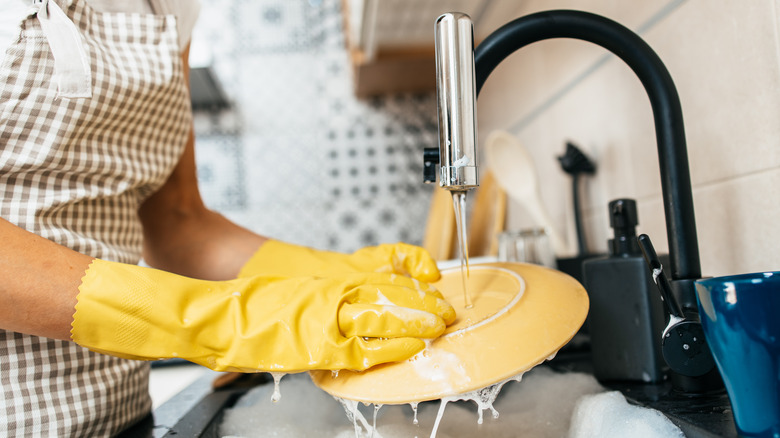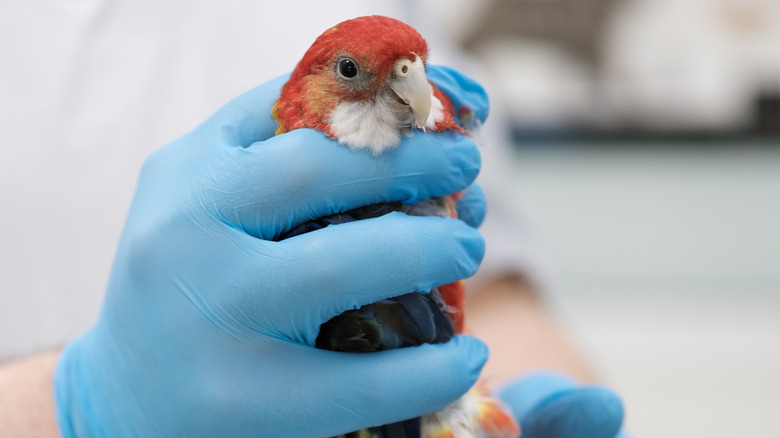The Most Important Place To Use Gloves In Your Home That You're Probably Missing
More likely than not, protective gloves are associated with cleaning one's bathroom, puttering in the workshop, or digging in the garden. Actually, the kitchen may be the most important place of all for donning the safety gear.
Kitchen gloves protect the user in the home's most germ-ridden room and afford similar protection to others in the household. The loo comes to mind as an unsanitary hotbed, but according to the Cleveland Clinic, the kitchen is home to E. Coli, salmonella, shigella, staphylococcus aureus, campylobacter, norovirus, and hepatitis A! Gloves help protect you from bacteria-filled kitchen sponges, icky dish towels, soiled countertops, and the contaminated kitchen sink itself. Burns, cuts, and chemicals are also no match for the Nitrile, latex, vinyl, or polyethylene hand protectors. The gloves are also a barrier against the foodborne pathogens responsible for more than 600 million illnesses a year, per Healthline.
In addition, protective gloves guard against hand injuries, and there are heat-resistant, cut-resistant, and dishwashing varieties available for kitchen use. They thwart the effects of hot water and caustic chemicals while dishes are being washed and protect the wearer from skin-damaging exposure during other kitchen chores — think about that the next time you cut up a batch of hot peppers.
Gloves for food and cooking
It pays to wear gloves when touching the refrigerator, opening the oven, turning on the kitchen faucet, or reaching for the trash bin. Moreover, fruits and veggies are covered with germs, so consider gloves when handling them. Handling food bare-handed is a common source of food poisoning, especially if the food is not cooked, warns State Food Safety. Working with raw meat and then touching other food items is a no-no, rather, gloves should be worn and immediately discarded to avoid cross-contamination.
FoodDocs recommends using kitchen gloves if you have burns or cuts on your hands, and the protective layer will also prevent your nail polish (or even fake fingernails) from entering the food being prepared. Waterproof dish gloves will conserve the oil in your hands as you wash the dishes. According to Quora, the FDA determined that 110 degrees Fahrenheit is the standard for hand-washing dishes in a commercial setting, therefore protective gloves save you from being scalded at home. Cut-resistant gloves provide enhanced safety and are often made from materials used in bulletproof vests — perfect for the next time you grate cheese. Kitchens and high temperatures go together, so there are PPEs designed to counter the extreme heat from cooking. Some even cover the wrist and extend up the forearm, protecting against temperatures as high as 1,400 degrees.
Gloves used elsewhere
There are also protective gloves with applications beyond the kitchen. Bite-proof gloves are available for handling and training animals. Gloves provide a level of protection when dealing with parrots, suggests Beak Craze, and should be on hand when cleaning out bird cages, while a special combined glove with an underside brush is available for grooming cats and dogs.
Protective gloves should always be used when there is an ill member in the house. They keep out bodily fluids and pathogens and are especially needed if the wearer's skin is compromised, per University of Massachusetts Lowell. Gloves also come in handy in a baby's changing area and are appropriate when disposing of diapers. As in all cases when wearing gloves, hands should be washed before and after their use, and the wearer should avoid touching face, eyes, or mouth. The CDC stresses that the outside of used protective gloves should be considered contaminated.
Protective hand wear will prevent problems while gardening, with fewer resulting callouses, blisters, and cuts. Thorns and poisonous plant secretions are stymied. Dirty hands will be a thing of the past, and your fingers will be unable to absorb pesticides. Gardening gloves with trowel-like claws for digging are even now an option, mixing protection and practicality.


